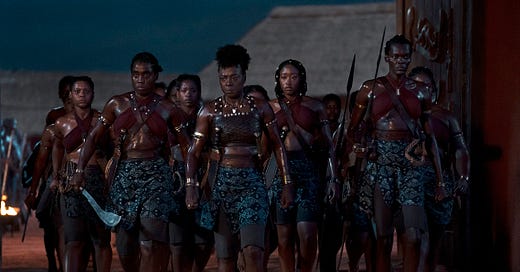One way a filmmaker can choose to quickly and easily let the audience know whose story is to be centered is through the use of subtitles, particularly when none of the characters in the story come from a land where English is the native language. Hence director Gina Prince-Bythewood’s decision to have the Dahomey and Oyo characters speak in African-accented English while the European slavers deliver their dialogue in subtitled Portuguese.
Indeed, at one point Dahomey King Ghezo (John Boyega)—despite being able to speak Portuguese—demands that the slaver with whom he is speaking speak “his” language. (Which, again, to our ears is English, but is “actually” Fon, the Dahomey language; you get the idea.) The point, simply, is this: language is power, and the person who gets to choose the language in which the story is told is the one with the power.
The Woman King is very much a movie about power: who has it, who doesn’t, and how to take it back. The Dahomey kingdom—protected by the all-female Agojie warriors and their general, Nanisca (Viola Davis)—is engaged in not-quite-open warfare with the Oyo kingdom, who have been selling enslaved Africans to the Portuguese. The Dahomey have also been selling enslaved Africans to the Portuguese, trading people for weapons, which they then use to capture more people for more weapons. They are capturing and enslaving each other, a cycle of violence that Nanisca understands is not a reflection of power but of weakness, one that will end up destroying the continent from the inside out.
One of the weaknesses of The Woman King is that it does very little with the inter-kingdom dynamics at play: the struggle between the Oyo and the Dahomey is somewhat opaque, as is the Dahomey’s relationship with the Portuguese slavers. It almost feels as though writer Dana Stevens, who shares a story by credit with Maria Bello, understood that audiences would recoil at the idea of the Dahomey, for whom we are supposed to be cheering, engaging heavily in that peculiarly grotesque institution, hence the decision to spend more time focused on the potential benefits of the palm oil trade.
The intra-kingdom dynamics are also not quite as clear as one might like. We see the Agojie and their Spartan-like training regimen through the eyes of Nawi (Thuso Mbedu), a new recruit offered to the king by her father because she is willful and refuses to accept an older, wealthy husband. But it does not become clear until a bit later that there is also a male contingent of warriors. Indeed, the first real look at them comes during an Agojie training montage, when Izogie (Lashana Lynch) and a male soldier each lean into opposite ends of a double-tipped spear, the loser being he whom turns from the pain first. (Spoiler: these are strong women who refuse to flinch.)
In other words, The Woman King is the rare movie that I wish had been 20 or 30 minutes longer than its 135-minute runtime. Though I can understand the need to keep things short, as the film’s action never really transcends competence into something like exuberance, and audiences would be unlikely to feel as though the wait between set pieces is worth it.
While The Woman King falters on questions of story and skirmish, it is nevertheless compelling throughout thanks to the performances delivered by Lynch, Mbedu, and the rest of the Agojie. Sheila Atim is a standout as General Nanisca’s confidante, Amenza. And Boyega is a quietly powerful and confident king; I wish we’d spent a little more time on the palace intrigue between him, his favored wife, and Nanisca.
But this is definitely Viola Davis’s show; as an older warrior, we see her aches and pains, the scars and sadness of soldiers lost. Davis’s eyes have these heavy lids that do a great deal of work no matter her role: as the tired, worried mother in Doubt who makes a horrible bargain to ensure her son a better life; as the calculating, ice-cold bureaucrat in charge of the Suicide Squad; or as a warrior queen who feels the weight of a continent on her shoulders. When combined with the power of her voice—there’s an almost masculine depth to her timbre—you can see why soldiers would snap to attention as she walks by.





